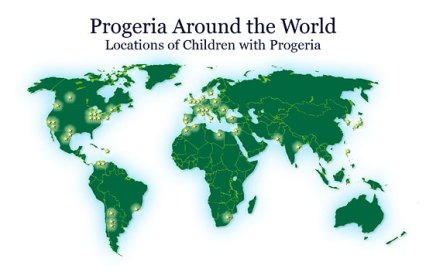The Progeria Research Foundation hosted their tenth international scientific workshop on Progeria, titled “From Bench to Bedside in a Decade” at the Seaport Hotel and World Trade Center in Boston, Mass. The three-day event was held April 11-12, 2010. Since PRF was founded in 1999, they have held five similar events. In these ten years, definitive tests to diagnose Progeria and possible treatments have been discovered. The workshops are especially significant to everyone working towards Progeria research, as this is the culmination of everything they work for. The workshop hosted 130 scientists from ten different countries, which demonstrates how research has become an international effort.
The very first workshop in 2001 was a joint effort from the National Institute of Health and PRF. It was here that Dr. Leslie Gordon announced PRF would create a cell and tissue bank and database to keep detailed information about children with Progeria.
The itinerary for PRF’s tenth anniversary workshop: “From Bench to Bedside in a Decade” The idea behind the workshops, which are held every two years, is to facilitate discussion and promote progress about Progeria among a growing number of researchers.
The topics included a discussion on living with Progeria, including a round table question and answer session from the patients’ perspective. Audrey Gordon is the President and Executive Director for PRF. She said this part of the workshop was exceptionally touching.
Once you meet them it’s amazing, I mean they’re such great kids and they’re really very dynamic and fun and truthful about everything, about all the questions that were asked and answered, said Gordon.
Three families attended the workshop; one from England, one from Canada and one from the United States. Tina Pickard’s son, Zach, is three years old and has Progeria. She said the opportunity to meet the researchers working for a cure for her son was beneficial to her family and the researchers alike.
Just to finally be able to say, oh, that is a child with Progeria. And you know, the same for us, when we walk in and you’re looking at these doctors and you’re like wow, they do this for a living, this is their job and they’re trying to find a cure for my son. It’s an overwhelming feeling, it’s really sweet, said Pickard.
Doctors from the Dana Farber Cancer Institute, Children’s Hospital Boston, and Brigham & Women’s Hospital talked about new findings as well as treatment with the FTI drugs in children with Progeria. Other experts discussed the relation of cardiovascular disease in mouse models to humans.
The workshop was named “From Bench to Bedside in a Decade” because the Progeria Research Foundation has come a great way in ten years. PRF is used as a model for other foundations and organizations looking to start up. Audrey Gordon says this all happens with a lot of support.
Ten years is an unheard of amount of time to go from start to drug trial – other organizations use us as a model. We started off with a vision and it really all comes together – from our cell bank for researching to doing the research. It all is a huge building block in just ten years. [There’s] never a dull moment, said Gordon.
The National Institute of Health issued a fact sheet on Progeria in 2007 detailing the scarcities of research over the past thirty years, what was known in 2007, and what the outlook was for ‘tomorrow.’ Since 2007, much can be added to this fact sheet. This is a testament to the work and research that has been devoted to Progeria.
The article questions the role of the LMNA gene in Progeria and its relation. It is now known that a mutation in this gene leads to Progeria. The article says future research may provide insight into heart disease, an affliction that a wide population experiences aside from patients with Progeria. Now, “there is a biological link between the Progeria disease process and aging and heart disease,” said Audrey Gordon, President and Executive Director of PRF. The article notes future lab research is preparing for the first clinical trial using Farnesyltransferase inhibitors to treat Progeria. Now, PRF is conducting its second clinical triple-drug trial which adds two other drugs in addition to the FTI treatment.
While a lot has happened in a short time, there are still a lot of questions. George Martin from the University of Washington spoke at the workshop about the unanswered questions regarding normal aging and aging in Progeria patients. Susan Rosenblatt is the executive assistant and volunteer coordinator for PRF. She says being able to see everyone come together every two years for these workshops is an amazing experience, even if you don’t under the science aspect.
I’m always amazed at the way, from a layperson’s point of view, I don’t understand a lot of the science but I’m really, what I find remarkable is how people work together to study Progeria and to move on from the workshop and form new partnerships for the future to study. It gives me a window into that whole piece of research that I can’t participate in but I constantly marvel at, said Rosenblatt.
There is much hope for the future. New insights and targets were considered among the experts at the workshop. “So, while at one point people are very excited about all that’s happened and all the knowledge we now have,” said Gordon, “there’s also the flip side that says okay, now there’s a lot more work to do.”





